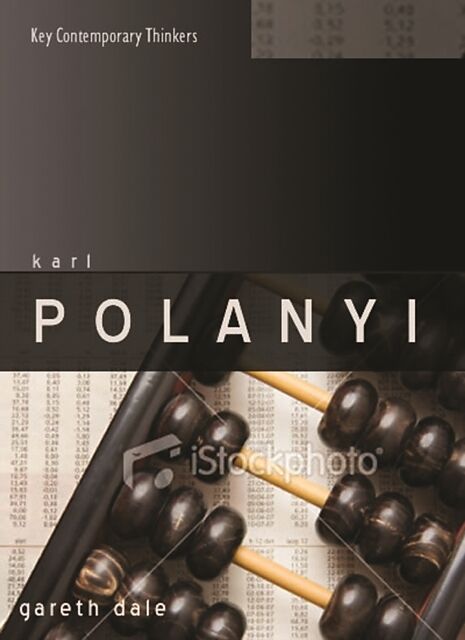Karl Polanyi
Einband:
Fester Einband
EAN:
9780745640716
Untertitel:
The Limits of the Market
Genre:
Politikwissenschaft
Autor:
Gareth Dale
Herausgeber:
Polity Press
Anzahl Seiten:
320
Erscheinungsdatum:
07.05.2010
ISBN:
978-0-7456-4071-6
Informationen zum Autor Gareth Dale is a Senior Lecturer at Brunel University Klappentext Karl Polanyi's The Great Transformation is generally acclaimed as being among the most influential works of economic history in the twentieth century, and remains as vital in the current historical conjuncture as it was in his own. In its critique of nineteenth-century 'market fundamentalism' it reads as a warning to our own neoliberal age, and is widely touted as a prophetic guidebook for those who aspire to understand the causes and dynamics of global economic turbulence at the end of the 2000s. Karl Polanyi: The Limits of the Market is the first comprehensive introduction to Polanyi's ideas and legacy. It assesses not only the texts for which he is famous - prepared during his spells in American academia - but also his journalistic articles written in his first exile in Vienna, and lectures and pamphlets from his second exile, in Britain. It provides a detailed critical analysis of The Great Transformation , but also surveys Polanyi's seminal writings in economic anthropology, the economic history of ancient and archaic societies, and political and economic theory. Its primary source base includes interviews with Polanyi's daughter, Kari Polanyi-Levitt, as well as the entire compass of his own published and unpublished writings in English and German. This engaging and accessible introduction to Polanyi's thinking will appeal to students and scholars across the social sciences, providing a refreshing perspective on the roots of our current economic crisis. Zusammenfassung Karl Polanyi's The Great Transformation is generally acclaimed as being among the most influential works of economic history in the twentieth century! and remains as vital in the current historical conjuncture as it was in his own. Inhaltsverzeichnis Preface. Abbreviations. Introduction. Karl Polanyi for the neoliberal age. Individual responsibility and the quest for community. Some systemically satanic features of capitalism. From civilizational breakdown to neoliberalism. Chapter 1: The economics and ethics of socialism. Responsibility and 'overview': the socialist accounting debate. Critique and rejoinder. The subjugation of moral ends to economic means. Towards a synthesis of Communism and Christianity. Chapter 2: The Great Transformation. The Liberal Century: contradictions of a golden age. Birth of the market economy. Malthus! Ricardo and Speenhamland. Marketization and its backwash. Disruptive strains and the end of elasticity. The originality of The Great Transformation. Some criticisms of the conceptual framework. Some criticisms of the historical argument. Chapter 3: The descent of Economic Man. From homo oeconomicus to homo communisticus. The debate over methods. From marginalism to formalism. Two meanings of economic. Mechanisms of integration. Inconsistencies and ambiguities. The formalist rejoinder. Marxist interpositions. The debate scatters and dissolves. Chapter 4: Trade! markets and money in archaic societies. Introduction: the oikos debate. 'Primitive' and archaic trade! markets and money. Ancient Mesopotamia: three theses. Mesopotamia: evaluation and critique. Trade and markets in Bronze and Iron Age Greece. Greece: evaluation and critique. West Africa: Dahomey! Whydah and Tivland. Dahomey and the Tiv: evaluation and critique. From Meso-America to rural India via the Berber Highlands. Conclusion. Chapter 5: 'Disembedded' and 'always embedded' economies. Embeddedness: a genealogy. Further adventures of a concept. Embeddedness and decommodification in the mid-twentieth century. Chapter 6: 'At the brink of a great transformation?' Neoliberalism and the countermovement today. Explaining the neoliberal ascendancy. Alternative futures: participatory planning and the mixed economy. No dearth of countermovements. Pendular forces. The Great Oscillation. In pla...
Autorentext
Gareth Dale is a Senior Lecturer at Brunel University
Klappentext
Karl Polanyi's The Great Transformation is generally acclaimed as being among the most influential works of economic history in the twentieth century, and remains as vital in the current historical conjuncture as it was in his own. In its critique of nineteenth-century 'market fundamentalism' it reads as a warning to our own neoliberal age, and is widely touted as a prophetic guidebook for those who aspire to understand the causes and dynamics of global economic turbulence at the end of the 2000s. Karl Polanyi: The Limits of the Market is the first comprehensive introduction to Polanyi's ideas and legacy. It assesses not only the texts for which he is famous - prepared during his spells in American academia - but also his journalistic articles written in his first exile in Vienna, and lectures and pamphlets from his second exile, in Britain. It provides a detailed critical analysis of The Great Transformation, but also surveys Polanyi's seminal writings in economic anthropology, the economic history of ancient and archaic societies, and political and economic theory. Its primary source base includes interviews with Polanyi's daughter, Kari Polanyi-Levitt, as well as the entire compass of his own published and unpublished writings in English and German. This engaging and accessible introduction to Polanyi's thinking will appeal to students and scholars across the social sciences, providing a refreshing perspective on the roots of our current economic crisis.
Zusammenfassung
Karl Polanyi's The Great Transformation is generally acclaimed as being among the most influential works of economic history in the twentieth century, and remains as vital in the current historical conjuncture as it was in his own.
Inhalt
Preface. Abbreviations. Introduction. Karl Polanyi for the neoliberal age. Individual responsibility and the quest for community. Some systemically satanic features of capitalism. From civilizational breakdown to neoliberalism. Chapter 1: The economics and ethics of socialism. Responsibility and 'overview': the socialist accounting debate. Critique and rejoinder. The subjugation of moral ends to economic means. Towards a synthesis of Communism and Christianity. Chapter 2: The Great Transformation. The Liberal Century: contradictions of a golden age. Birth of the market economy. Malthus, Ricardo and Speenhamland. Marketization and its backwash. Disruptive strains and the end of elasticity. The originality of The Great Transformation. Some criticisms of the conceptual framework. Some criticisms of the historical argument. Chapter 3: The descent of Economic Man. From homo oconomicus to homo communisticus. The debate over methods. From marginalism to formalism. Two meanings of economic. Mechanisms of integration. Inconsistencies and ambiguities. The formalist rejoinder. Marxist interpositions. The debate scatters and dissolves. Chapter 4: Trade, markets and money in archaic societies. Introduction: the oikos debate. 'Primitive' and archaic trade, markets and money. Ancient Mesopotamia: three theses. Mesopotamia: evaluation and critique. Trade and markets in Bronze and Iron Age Greece. Greece: evaluation and critique. West Africa: Dahomey, Whydah and Tivland. Dahomey and the Tiv: evaluation and critique. From Meso-America to rural India via the Berber Highlands. Conclusion. Chapter 5: 'Disembedded' and 'always embedded' economies. Embeddedness: a genealogy. Further adventures of a concept. Embeddedness and decommodification in the mid-twentieth century. Chapter 6: 'At the brink of a great transformation?' Neoliberalism and the countermovement today. Explaining the neoliberal ascendancy. Alternative futures: participatory planning and the mixed economy. No dearth of countermovements. Pendular forces. The Great Oscillation. In place of a conclusion: thoughts on the current predicament. Conclusion. A liberal anti-Com…

Leider konnten wir für diesen Artikel keine Preise ermitteln ...
billigbuch.ch sucht jetzt für Sie die besten Angebote ...
Die aktuellen Verkaufspreise von 5 Onlineshops werden in Realtime abgefragt.
Sie können das gewünschte Produkt anschliessend direkt beim Anbieter Ihrer Wahl bestellen.
Loading...
Die aktuellen Verkaufspreise von 5 Onlineshops werden in Realtime abgefragt.
Sie können das gewünschte Produkt anschliessend direkt beim Anbieter Ihrer Wahl bestellen.
| # | Onlineshop | Preis CHF | Versand CHF | Total CHF | ||
|---|---|---|---|---|---|---|
| 1 | Seller | 0.00 | 0.00 | 0.00 |
